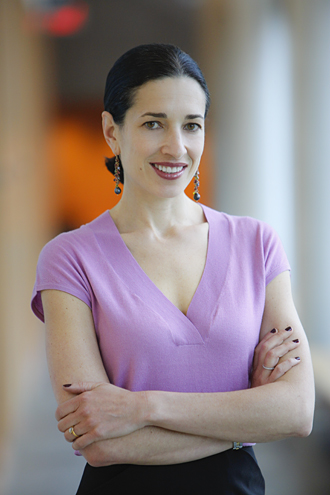Targoff to use Guggenheim to study love after death
English professor exploring differences between England and the Continent
 Photo/Mike Lovett
Photo/Mike LovettProfessor of English Ramie Targoff is Brandeis' latest Guggenheim Fellow.
Professor of English Ramie Targoff, whose research focuses on the relationship between poetry and religion in the literature of Renaissance England, has been awarded a 2012 Guggenheim Fellowship.
The $40,000 award will enable Targoff – who already was scheduled to serve as a scholar in residence at the American Academy in Rome next semester – to devote a full year, starting this summer, to the completion of her work in progress, a book entitled “Posthumous Love: Eros and the Afterlife in Renaissance England.”
The work, to be published by the University of Chicago Press, explores the boundaries that English poets drew between earthly love and love that might transcend the grave -- why couples wanted to be buried together, how lovers imagined what awaited them after their deaths, and what might be gained—both emotionally and poetically—by imposing mortal limits on love.
Targoff, the 27th member of the Brandeis faculty to win a Guggenheim, said the award “is a tremendous affirmation of my work, and comes at a most opportune time. I am two-thirds of the way through the book, and this validates the project. It means the book has an audience.”
The idea for the project arose from a perception Targoff had while working on and teaching “Romeo and Juliet.”
“I started to read the sources” which Shakespeare drew upon, she said, “and discovered that the end of the story in all the Italian and French sources was totally different from Shakespeare’s play.
“It was a radical innovation by Shakespeare,” she said. In all the earlier sources, the star-crossed lovers say “our souls will meet in Heaven,” Targoff said, and “Shakespeare just ripped that out, rejecting that love would transcend the grave. I thought, ‘Wait a second., I can’t think of a moment in all of English Renaissance literature where lovers go to heaven together, while in Petrarch and Dante that is something central.”
The project is an effort to work out why and how that happened, she said, and involves explorations of the Protestant Reformation, relations between the living and the dead, and poetry ranging from the first translations of Petrarch through the explosion of carpe diem lyrics during the years surrounding the English civil war.
At Brandeis, Targoff, who also serves as Jehuda Reinharz Director of the Mandel Center for the Humanities, teaches courses on Shakespeare, Renaissance literature, love lyrics, witchcraft and magic and devotional poetry. She received her B.A. in English from Yale University in 1989, and her Ph.D. in English from the University of California, Berkeley, in 1996.
She is the author of two books, “Common Prayer: The Language of Public Devotion” and “John Donne, Body and Soul,” and is co-editor of a new edition of Thomas Browne’s “Religio Medici and Urne-Burial.”
Targoff previously has received fellowships from the National Endowment for the Humanities, the Wissenschaftskolleg zu Berlin and the American Council of Learned Societies.
Often characterized as "midcareer" awards, Guggenheim Fellowships are intended for men and women who have demonstrated exceptional capacity for productive scholarship or exceptional creative ability in the arts.
Grants are made for a minimum of six months and a maximum of 12 months. Since the purpose of the Guggenheim Fellowship program is to help provide fellows with blocks of time in which they can work with as much creative freedom as possible, no special conditions are attached and fellows may spend their grant funds in any manner they deem necessary to their work.
The Guggenheim Foundation receives between 3,500 to 4,000 applications annually.
Categories: Humanities and Social Sciences, Research





